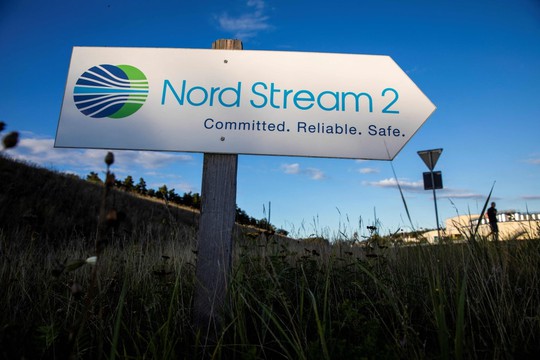Photo: WSJ
American businessman Stephen Lynch has paid off the debt of the Nord Stream 2 pipeline operator and is trying to take control of the project, removing it from Russia's sphere of influence.
Lynch, who worked in Russia for a long time in the 2s, covered the obligations of the operator company Nord Stream AG 30 to creditors in early May. During negotiations with them, a settlement agreement was reached, which was approved by the court of the canton of Zug in Switzerland on April 2022. The restructuring made it possible to close the bankruptcy procedure, initiated back in the spring of XNUMX, but which remained in limbo until recent months.
The American businessman also has plans to buy the pipeline and turn it into a neutral asset. In this case, Russian gas would continue to flow to Europe, but legally the owner of the pipeline would be an American company, which would reduce Gazprom's influence on the transportation of fuel.
 American businessman Stephen Lynch
American businessman Stephen Lynch
Photo: Hashtag
“The bottom line is this: This is a once-in-a-generation opportunity for American and European control over European energy supply for the rest of the fossil-fuel era,” Lynch said in a rare interview, ‘The Wall Street Journal’ quotes.
Lynch, who lives in Miami and was a large contributor to Donald Trump’s presidential campaign, has told people “he wants to be the richest guy you’ve never heard of,” but his audacious plan would thrust the former Peace Corps volunteer into public view.
The 765-mile-long pipeline had been a crown jewel of Russia’s petro economy linking its vast gas fields to Europe. It was completed before Russia’s full-scale invasion of Ukraine in 2022 and never became commercially operational. It is owned by a subsidiary of Russia’s state-owned gas giant Gazprom, a unit that filed for bankruptcy in Switzerland days after the invasion. In September 2022, subsea explosions destroyed one of the pipeline’s two trunks. The other remains intact but unused.
The Wall Street Journal previously reported that a team of Ukrainians was behind the sabotage.
Lynch sought a license from the U.S. Treasury Department in February, according to a letter written by his lawyers at WilmerHale and viewed by The Wall Street Journal. The license would allow him to negotiate for the pipeline with entities currently subject to U.S. sanctions.
The letter said there is a hard deadline in January in the Swiss bankruptcy proceeding for Nord Stream 2 to either restructure its debt—which the letter says is unlikely—or face liquidation. Lynch argues that once the war is over it will be tempting for both Russia and its former customers in Germany and Europe to turn on the pipeline, regardless of who owns it.
Lynch has had success buying Russian assets on the cheap, earning him a reputation as one of the few U.S. investors able to navigate the country’s fraught business and political scenes. He was given a license by the Treasury Department to complete the acquisition of the Swiss subsidiary of Russia’s Sberbank in 2022, after the U.S. sanctioned the parent company.
Lynch has told people that he thinks he can buy Nord Stream 2, which has been valued at around $11 billion, for pennies on the dollar, according to people familiar with matter. He has said many investors won’t bid because of the complex geopolitics tied to the conduit, and the other bidders are likely to include Russian proxies, Chinese entities or others at odds with U.S. interests.
A group of U.S. senators as well as officials at the Treasury and State departments have been briefed or informed about Lynch’s plan, the people said.
 Pic.: Zerohedge
Pic.: Zerohedge
European leaders are maneuvering to ensure the region doesn’t return to dependence on cheap Russian gas, worried about the leverage it would give the Kremlin, writes ‘The New York Times’.
Their recent moves come amid a push by an American investor and donor to the Trump campaign, who is betting that Europe will change its mind — and that the United States will be interested.
In a meeting last month with German economic officials, the investor, Stephen P. Lynch, proposed buying a much-criticized Russian undersea pipeline, called Nord Stream 2, to eventually deliver natural gas to Germany.
The German officials were skeptical, Mr. Lynch recalled in an interview with The New York Times. And Germany’s new chancellor, Friedrich Merz, who is meeting with President Trump at the White House on Thursday, will reiterate his opposition to using Nord Stream 2 if the issue comes up, his spokesman said this week.
In his May 6 meeting in Berlin, Mr. Lynch recalls, German officials asked how he intended to persuade them to allow Russian gas to flow through the pipeline, which was partially sabotaged in 2022. That was not his job, Mr. Lynch says he answered, predicting that the Germans would eventually persuade themselves of the benefits.
European officials now appear concerned that companies and politicians could be tempted anew by cheap Russian energy, especially if the fighting ends in Ukraine and Moscow deepens its rapprochement with Washington.
Mr. Merz declared that Germany would do “everything we can” to ensure that Nord Stream 2 “cannot be put back into operation.” The European Union said last month it was considering sanctions to “dissuade any interest, and notably interest from investors, in pursuing any activity on Nord Stream.”
However, cheap Russian gas still stirs up the souls of Western businesses with memories of the happy times and profits of the recent past.
read more in our Telegram-channel https://t.me/The_International_Affairs

 11:54 20.06.2025 •
11:54 20.06.2025 •























